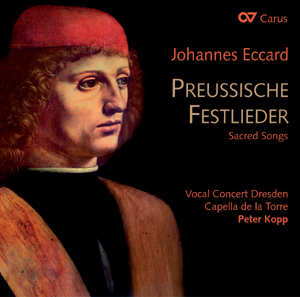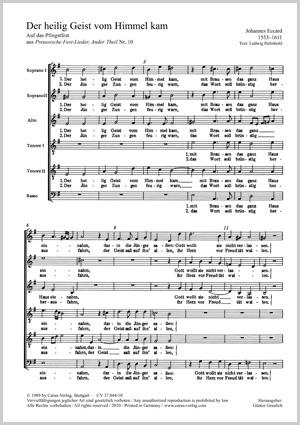
Preussische Festlieder
Contents
-
Composer
Johannes Eccard
| 1553-1611
-
Preface writer
Christoph Koop
-
Choir
Vocal Concert Dresden
The Vocal Concert Dresden, which was founded as “Körnerscher Sing-Verein” by Peter Kopp in 1993, consists largely of graduates of the Dresden Hochschule für Musik and former members of the Dresden Kreuzchor. The chamber choir’s challenging repertoire extends from programs featuring the music of Schütz, Bach, Handel, Haydn, Mendelssohn and Brahms to contemporary compositions, some of which it has premiered. The ensemble’s interpretative insight and, most importantly, the emotional impact of its concerts, have contributed to its reputation for exceptional performances and to its artistic standing. It is constantly credited with stylistic assurance and an elegant, natural approach to music-making. The choir has appeared in a number of concerts staged by the Dresden Staatskapelle and the Dresden Philharmonic. It has made guest appearances at Bachwoche Ansbach, the Göttinger Händel-Festspielen, the Schlossfestspiele Potsdam, the Händel-Festspielen Halle, the Ravello Festival (Italy), in Poland and Holland, and also repeatedly in the USA. A prominent feature of its programs is music of the late 18th century, for which the Vocal Concert Dresden has developed a particular affinity. Personal details
-
Ensemble
Capella de la Torre
Capella de la Torre, founded by Katharina Bäuml in 2005, is a group of musicians who have made a name for themselves as specialists in historical performance practice. The ensemble’s aim is to provide listeners the immediate experience of the rich and hitherto neglected repertoire of medieval and renaissance music as performed historical instruments. The name “de la Torre” has a double meaning. In the first place, it pays homage to the Spanish composer Francisco de la Torre, who wrote his “Danza Alta” at the beginning of the 16th century. This is probably the most famous piece for what was then known as “capella alta,” an ensemble of wind instruments such as shawms, dulcians, sackbuts and cornetti. Capella de la Torre has specialized in music written for the “capella alta.” Secondly, the name may be taken in a literal sense: “de la Torre” means “from the tower” and groups of wind players (Spanish: ministriles) often played on towers or balconies at festivals and other official occasions. “Torres de los Ministriles” are still to be found in many Spanish towns today. However, Capella de la Torre does not confine itself to Spanish music, rather it also plays music from throughout the rest of Europe written for the “hauts instruments” or “loud instruments”. In general, it tries to breathe life into the old traditions of “ministriles”, “piffari” and “Stadtpfeiffer”. In the meantime, the group has recorded five CDs and appeared on numerous radio broadcasts. The ensemble has been invited to appear at the Tage Alter Musik Regensburg, Zeitfenster – Biennale für Alte Musik, Innsbrucker Festwochen, Laus Polyphoniae (Belgium), Oude Muziek (Netherlands), Musique et Memoire (France), “La Folía” (Switzerlánd) and at the Festival de Musica Antigua de Malaga (Spain). Personal details
-
Conductor
Peter Kopp
After singing in the Dresden Kreuzchor as a schoolboy, Peter Kopp trained both as a church musician and as a choral and orchestral conductor at the Dresden Hochschule für Musik. While still a student he directed the Dresden Bach Choir. Since 1995 he has been a choral conductor of the Dresden Kreuzchor, which he was engaged to direct when the post of Kreuzkantor was vacant. His diverse musical activities have taken him abroad on a number of occasions. He is particularly interested in rediscovering forgotten gems from Saxony’s musical history. In this respect, performances and CD recordings of works by Johann Gottlieb Naumann have had the same lasting resonance as his most recent releases, “Christmas at the Dresden Court” (Carus 83.169), “Christmas in the Dresden Frauenkirche” (Carus 83.170), and the first recording of the most important Vivaldi discovery for seventy years, the Dixit Dominus. In 2002 Peter Kopp was awarded the Johann Walter Plaquette of the Saxon Music Council, followed by the Sponsor Prize of Dresden, the state capital of Saxony, in the spring of 2003. In addition he regularly appears as a guest conductor with the Bach Society of Houston/Texas and has given courses in choral conducting at two universities there. Personal details
Reviews
…Jirka and his forces are back to their serious best …
(International Record Review, Juli/August 2012)
… Das Vocal Concert Dresden erweist sich erneut als einer der derzeit besten Chöre Deutschlands. …
(ich-habe-gehoert.blogspot.de, 7. März 2012)
… The instrumental element throughout the album is always in perfect counterbalance to the vocal element: never overpowering, always complementary. … Kopp, the Capella de la Torre, and Vocal Ensemble Dresden provide a worthy representation of this style through very fine performances.
(Vicente Chavarria, Choral Journal, März 2012)
Das Vocal Concert Dresden verfügt über eine beglückend-differenzierte Ausdrucksbreite. So könnten die Preussischen Festlieder damals geklungen haben. Was für ein Gewinn, dass ihnen Peter Kopp und seine Mitstreiter wenigstens per CD zu einem neuen klingenden Leben verholfen haben.
(Ingeborg Allihn, Musik & Kirche, Januar/Februar 2012)
… delightful and thoughtful performance …
(Gary Higginson, musicweb-international, Januar 2012)
Der exzellent artikulierende Chor und das agil spielende Ensemble verschmelzen ohne Bruch zu dem vokal-instrumentalen Mischklang, den die Schütz-Epoche in besonderer Weise kultivierte. … Unter Leitung von Peter Kopp bieten beide Klangkörper einen reizvollen Querschnitt durch die erste protestantische Hochblüte der geistlichen Vokalmusik. Diese CD ist ein Geschenk für jeden Kirchenchorsänger – und für jeden, der konventionelle geistliche Chormusik liebt.
(Michael Klein, Glaube und Heimat - Mitteldeutsche Kirchenzeitung, 13. November 2011)
… Peter Kopp präsentiert diese durchaus farbigen Kompositionen mit seinem Vocal Concert Dresden, tatkräftig unterstützt von Katharina Bäumls famosem Bläserensemble Capella de la Torre. … Aus der intensiven Wechselwirkung von vokaler und instrumentaler Sphäre erwachsen frische interpretatorische Impulse. … Es lohnt sich also, auch vermeintlich kleinere Jubiläen zu feiern. Zumal dann, wenn damit ein so erfreulicher diskographischer Ertrag verbunden ist.
(Dr. Matthias Lange, klassik.com, 19. Oktober 2011)
Diese "preußischen Festlieder" hat ein sächsischer Chor ausgegraben, das Vocal Concert Dresden mit seinem Leiter Peter Kopp. Es handelt sich dabei um eine Sammlung von Motetten, die auf geistlichen Liedern basieren und zum Wichtigsten gehören, was vor der Zeit von Heinrich Schütz im deutschen Sprachraum an Musik entstanden ist. Reizvoll ist hier die Verbindung des Gesangs mit dem schalmeienlastigen Klang des Ensembles "Capella de la Torre".
(mdr-figaro, Take 5, 12. September 2011)
Frequent questions about this work
 There are no questions and answers available so far or you were unable to find an answer to your specific question about this work? Then click here and send your specific questions to our Customer Services!
There are no questions and answers available so far or you were unable to find an answer to your specific question about this work? Then click here and send your specific questions to our Customer Services!





